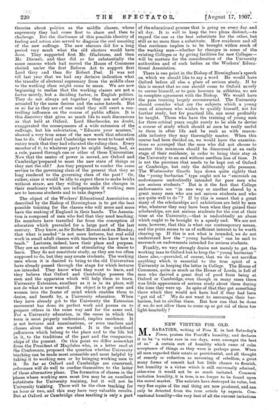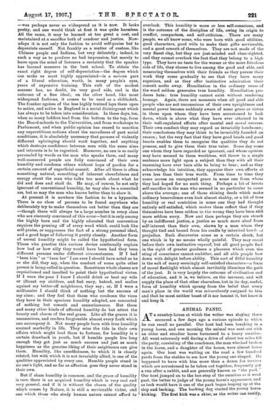NEW VIRTUES FOR OLD. -
MSABATIER, writing of Pius X. in last Saturday's • Times, praises the Pontiff's humility, and declares it to be "a virtue rare in our days, even amongst the best of us." A certain sort of humility which came of calm acceptance of things as they were is perhaps gone. When all men regarded their estate as providential, and all thought of remedy or reduction as savouring of rebellion, a -great many forms of conceit had but little chance to flourish, but humility is a virtue which is still universally admired, otherwise it would not be .so much imitated. Common imitation humility, it is true, is no longer to be found upon the Moral. market. The satirists have destroyed its.value, but Very fine copies of the real thing are now produced, and Gall only. be detected from the true. article by, experts. Con- ventional humility—the very best of all the current imitations • Times, praises the Pontiff's humility, and declares it to be "a virtue rare in our days, even amongst the best of us." A certain sort of humility which came of calm acceptance of things as they were is perhaps gone. When all men regarded their estate as providential, and all thought of remedy or reduction as savouring of rebellion, a -great many forms of conceit had but little chance to flourish, but humility is a virtue which is still universally admired, otherwise it would not be .so much imitated. Common imitation humility, it is true, is no longer to be found upon the Moral. market. The satirists have destroyed its.value, but Very fine copies of the real thing are now produced, and Gall only. be detected from the true. article by, experts. Con- ventional humility—the very best of all the current imitations —was perhaps never so widespread as it- is now. It looks pretty, and one would think at -first it was quite harmless. All the same, it may be learned at too' great a cost, and Maintained at a sacrifice both of candour-and justice. 'Now- adays it is not only the fashion to avoid -self-praise but to depreciate oneself. Not frankly as a matter of • custom, like Chinese people and Indians, but very delicately ; indeed, in such 'a way as to produce no bad impression, but merely to leave upon the mind of listeners a certainty that the speaker has learned manners in the best school. To obtain the exact right degree of self-depreciation—the degree which can make us most •highly appreciated—is • a serious part of a liberal education, worth, in many people's eyes, years of expensive training. This cult of the modesit manner has, no doubt, its very good side, and is the outcome of a fine ideal; on the other hand, like most widespread fashions, it comes to be used as a shibboleth. The franker egoism of the less highly trained lays them 'open to. satire, and satire in England is a social disintegrant which has always to be taken into consideration. In these days, too, when so many ladders lead from the bottom to the top, from the Board-schools to the Universities, and from workshops to Parliament, and when public opinion has ceased to sanction any superstitious notions about the sacredness of past social conditions, it is absolutely necessary that persons of. violently different upbringing should work together, and anything which destroys confidence between -men with the same aims and interests is to be regretted.• Moreover, no one is so easily persuaded by words as the man who speaks them, and many well-mannered people are fully convinced of their own humility and condemn others without hope of pardon for a certain amount of superficial conceit. After all there is often something natural, something of inherent cheerfulness and energy about the man who talks too much about what he did and does and shall do. He may, of course, be not only ignorant of conventional humility, he may also be a conceited ass, but so may the man who knows better than to show it.
At present it is nowhere the fashion to be a hypocrite. There is no class of persons to be found anywhere who deliberately try to make themselves out better than they are —though there will. always be a large number in every class who are sincerely convinced of this error—but it is only among the highly born and the highly educated that convention requires the pruning off of every word which could look like self-praise, or suppresses the fact of a strong personal ideal, and a good hope of following it pretty closely. Another form of unreal humility might be called the hypothetical form. Those who practise this curious device continually explain how had or how silly they would have been had they been different persons under different circumstances. If . I had "been him" or "been Ler" I am sure I should have acted as he or she did, they say, when the conduct of some quite other person is being called in question. Sometimes whole classes are requisitioned and insulted to point their hypothetical virtue. If I were the poor I know I should drink or beat my wife or ilitreat my children, and feel- envy, hatred, and malice against my better-off neighbours, they say ; or, If I were a millionaire I should think of nothing but the success of my aims ; and they feel that those who condemn the vices they have in their spurious humility adopted, are concocted of • nothing -but conceit and censoriousness. But these and many other kinds of affected humility do -but attest the beauty and charm of the real grace. Like all the graces it is unconscious, and renders forgiveable almost every fault which can accompany it. Not many people born with true humility succeed markedly in life. They miss the tide in their own affairs which might lead them to fortune, for humility is a certain drawback in youth, but if humble people live long enough they get just as much success and just as much happiness as the genuine liking of their neighbours can give them. Humility, like unselfishness, to which it is closely related, but with which it is not invariably allied, is one of the qualities appreciated by every one. Humble people stand in no one's light, and so far as affection goes they never stand in their own.
But if sham humility is common, and the grace of humility is rare, there is an acquired humility which is very real and very general, and if it is without the charm of the quality which conies by Nature, it is still a serviceable virtue, and one which those who study human nature cannot afford to
overlook: This humility is more or lees self-conscious, and is thenutcome of • the discipline of life,- owing its: origin .to- conflict, • comparison,. and self-criticism.: There are many people, we all know some, who were born with :good abilities, good' characters,' good :wills to make their gifts serviceable, and a good conceit of themselves. They are- not made of the very finest clay, but they are just-minded and clear-sighted, and they cannot overlook the fact that they belong to a high type. They have no taste for the worser or the more frivolous side of life, they choose to live among the good and able, and measuring themselves with their friends as they pursue their work they come gradually to see that they have many superiors, and as they offer instinctive admiration their conceit melts away. Humiliation in the ordinary sense of the word seldom generates true humility. Humiliation pro- duces hate : true humility cannot exist without rendering homage. Again, there are moments when all good and able people who are not unconscious of their own uprightness and mental power become suddenly aware of some grace or virtue in those upon whom they have been accustomed. to look down, which is above what they have ever attained to in their well-regulated efforts after mental and moral success. Their own conduct they may regard as invariably. handsome ; their conclusions they may think to be invariably,Nunded qn reason ; but the very fact that they have good heads, and good hearts enables them to recognise the qualities they, do not possess, and to give them their true value. Some day some one whom they have regarded as ignorant, and whose opinion may have seemed to them worthless, will throw iu a single sentence more light. upon a subject than they with all their reasoning have ever been able to bring to bear; and as they aCknowledge his intuition, they. appraise their own efforts at even less than their true worth. From time to time they come across an unexpected grace in some one from whom they had hoped for no' such thing. Perhaps a bit of heroic self-sacrifice in the man who seemed in no particular to come above the'average-; one of those shining deeds which make ordinary benevolence even look almost shabby, or a-bit of true humility or real contrition in some one they. had , thought entirely self-satisfied, which makes them reflect that if they themselves have been seldom iu the wrong they have been still More seldom sorry. Now and then. perhaps they -are struck by an indifferent justice, a justice so much more :aloof from self-interest than their own, shown by a man whom. they thought tied and bound from his cradle by inherited banas of prejudice. Such discoveries come as a certain 'shock, but one which is by no means wholly painful. They. may recoil before their own instinctive reproof, but all good people; find in the sight of greater goodness a pleasure which even the sting of conscience cannot embitter, and all able people. bow down with delight before ability. This sort of fitful humility is the salt of many seemingly self-satisfied characters=tt forta of moral flashlight which almost inevitably illumines the path of the just. It is very largely the outcome of civilisation and of education, and it is, we believe, on the .increase, and will supply the place of that other charmless, but. in its day, useful, form of humility which sprang from the belief that. every man's place in the world was miraculously assigned to hint and that he must neither boast of it nor lament it, but knom it and keep it.



































 Previous page
Previous page